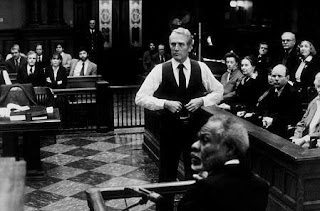 Loosen your girdles and put your feet up. This is a long one.
Loosen your girdles and put your feet up. This is a long one.Facts. Well, I can only give you an overview of the facts as I heard them. One of our jurors kept saying that a fact was a fact (and of course, those “facts” just happened to be the way he saw them), but we all know that while, yes, a fact is a fact, whatever it is comes filtered through an awful lot of stuff before it reaches your grey matter. Thus, facts aren’t always “facts.” And sometimes there is a disconnect between “fact” and “truth.”
That said, here’s an outline of the “facts,” sprinkled with my own biases and truth. since it can’t be done any other way:
1. The plaintiff (aged 58 in 2002, the time of the incident) – nice, hard-working family man (nobody disputes that, so I’ll consider it a “fact”), originally from New York but living in Florida for the past 30 years or so; musician on the side. Active, until diagnosed with prostate cancer, the disease which had killed his father some years earlier. Plaintiff decides to nip it in the bud, as it were, and opt for a radical prostatectomy. He decides to have the operation in New York by a noted urologist rather than in Florida and goes to see the urologist at NYU to schedule the operation.
2. The New York urologist schedules the operation but insists that plaintiff have a series of pre-op tests with his doctors in Florida, including a cardio stress test, because of plaintiff's other medical issues – diabetes, hypertension, lupus anticoagulant. Plaintiff goes back home to Florida to have the tests and wait for the operation. During the cardio stress test, doctors discover that plaintiff has major blockage that requires stenting in a couple of arteries (July). Prostatectomy postponed.
3. A couple of months later (August), another blockage occurs and plaintiff has to have another artery stent. Prostatectomy postponed again.
 4. Prostatectomy is re-scheduled for October. Florida cardiologist clears plaintiff for surgery in a letter dated early September. Florida internist clears plaintiff for surgery a few days before plaintiff leaves for New York, even though plaintiff complains of pain in left shoulder, upper arm, and neck.
4. Prostatectomy is re-scheduled for October. Florida cardiologist clears plaintiff for surgery in a letter dated early September. Florida internist clears plaintiff for surgery a few days before plaintiff leaves for New York, even though plaintiff complains of pain in left shoulder, upper arm, and neck.5. Plaintiff arrives in New York a week before scheduled prostatectomy for more pre-op tests. Still has shoulder/arm/neck pain, but not severe. Reports pain to urologist and hematologist (had to see him for plaintiff’s lupus anticoagulant problem) during exams. Hematologist sends plaintiff to a cardiologist for clearance because of plaintiff’s recent stents; mentions arm/neck pain – but not concerned.
6. Per cardiologist, he “squeezes in” plaintiff for a cardio work-up, at request of hematologist colleague. No medical records/history paperwork given to cardiologist before exam. His work-up is determined by a 10-minute interview with plaintiff. Cardiologist corroborates plaintiff's recollection of interview, including information on recent stenting, diabetes, hypertension, lupus anticoagulant, medications (a long string of them), and the neck/shoulder pain.
7. Cardiologist moves the arm around, determines it’s not heart-related, just a pinched nerve or something (nothing definitive), and prescribes Tylenol with codeine. He listens to the plaintiff’s chest, then does an EKG – which was reported to show “within normal range” – and clears plaintiff for the radical prostatectomy scheduled for six days later. Cardiologist never notes on his exam report that plaintiff has neck/shoulder pain, or that he prescribed medication for the pain. He gives plaintiff a business card and says to call if pain gets worse or if another symptom develops. And, oh, by the way, he’ll be out of town until Tuesday (Columbus Day holiday), but his service can take the call.
8. Plaintiff gets Tylenol with codeine prescription and goes to his daughter’s house in New Jersey to await the operation. There are some family things going on – daughter has high-risk pregnancy and is about to deliver – and everyone’s worried on a variety of levels. Neck and shoulder pain persist, though the codeine helps. Family goes out to a restaurant Saturday evening and plaintiff develops what he thinks (or insists) is heartburn.
9. Heartburn persists; wife and daughters (allegedly) call cardiologist’s service. An on-call cardiologist and member of cardiologist’s medical group (allegedly) returns the call, listens to plaintiff’s complaint of chest burning/heartburn and his history, and (allegedly) prescribes Pepcid AC. Doctor (allegedly) tells plaintiff to go to the emergency room and/or call back if symptoms persist. There is no record of this phone call, and no phone records were submitted by either plaintiff or defendants (all lawyers later said that records were no longer available from 2002, no way to prove one way or the other if the call was placed).
 10. Plaintiff takes Pepcid AC. The “heartburn” eases but sticks around, as does the neck and shoulder pain. Plaintiff doesn’t go to emergency room; doesn’t call the cardiologist on Tuesday. Plaintiff (allegedly) thinks his pain is being treated properly and that he is just nervous about impending operation.
10. Plaintiff takes Pepcid AC. The “heartburn” eases but sticks around, as does the neck and shoulder pain. Plaintiff doesn’t go to emergency room; doesn’t call the cardiologist on Tuesday. Plaintiff (allegedly) thinks his pain is being treated properly and that he is just nervous about impending operation.11. Plaintiff goes to hospital for prostatectomy on Thursday morning. Pre-op paperwork (allegedly) filled out by attending nurse anesthetist shows a brief medical history of plaintiff, though no mention of shoulder/neck pain. Paperwork shows, “denies chest pain.” (And there was a lot of quibbling about what “denies chest pain” means here.)
12. Plaintiff goes in for prostatectomy – successful (no wrongdoing alleged about this) – but experiences a massive heart attack just after returning to recovery room, resulting in extreme heart damage and the need for a defibrillator/pacemaker.
One primary question before us was: Did the NY cardiologist depart from acceptable medical practice by not taking plaintiff’s complex medical history and the neck/shoulder/arm pain seriously enough to warrant more than an EKG for post-op clearance? Did his paperwork/clearance omit important facts of the case as he (the cardiologist) passed plaintiff through the medical system?
The other question was: Did the plaintiff do everything he could do to ensure his own cardiac safety leading up to the operation? Specifically, did he really tell anyone(s) about his persistent chest-burning either in the days leading up to the operation or when he got to the hospital the morning of the operation?
Hmmmmm?

No comments:
Post a Comment